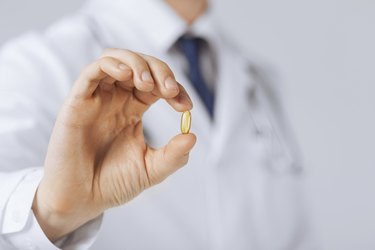
Your new diet pills promised to maximize your energy so you could burn off the fat, so why are you yawning? The answer is the caffeine. Some diet pills such as orlistat help you lose weight by inhibiting fat absorption, but most operate through a stimulant mechanism. It may be advertised as "thermogenics" or "energy precursors," but it's really just caffeine. Initially you may feel like you could run a marathon, but rest assured, a crash will soon follow.
Caffeine
Video of the Day
Most diet pills contain caffeine and it's no wonder why. The quick energy boost you get after taking a pill may encourage you to exercise, which will help you lose weight. Caffeine may also reduces your appetite, according to the National Institutes of Health, and it has a diuretic effect which helps your body expel retained water. These three effects may combine to nudge the scale downward a bit, making you think the pills are working, so you buy more. But contrary to what you might think, it's also the caffeine that makes you sleepy.
Video of the Day
Stimulation
When you take your diet pill, the gelatin capsule dissolves quickly upon reaching the stomach. The caffeine enters your bloodstream and goes straight to your brain, where it binds to adenosine receptors, leaving free adenosine circulating without anywhere to go. This makes your adrenal glands panic, triggering a fight-or-flight response in your body. Your heart rate and blood pressure increase as blood is rushed to your extremities in preparation for quick muscular contractions, and your entire body is on high alert. This is the stimulant effect of the diet pills, but it doesn't last very long.
Crash
Once the caffeine supply runs out -- which depends upon the dose and other ingredients -- your body calms back down. You're more tired at this point than you were before you took the diet pill because the fight-or-flight response used a tremendous amount of resources, and you're now depleted. You may also suffer a headache as your blood vessels dilate to allow your blood pressure to return to normal levels, and your blood sugar will drop because you used most of your available energy sources in your caffeinated state. Many people turn to another caffeine source as a pick-me-up during this stage, or it may be time for your next diet pill dose. Ingesting more caffeine allows the cycle to restart closer to bedtime, which can delay the onset of sleep. Then you wake up tired in the morning and begin the whole process again. Over time, your entire sleep cycle can be disturbed, causing ongoing fatigue.
Safety
Diet pills that contain caffeine generally contain about the same amount as a cup of coffee, but determining the exact amount can be tricky. Manufacturers are not required to list the total caffeine content on the label, and the amount next to the word "caffeine" is only the amount of caffeine that was added separately. Other ingredients may also contain caffeine, such as green tea, kola nut, guarana, ma huang and others. People who are sensitive to caffeine, pregnant, breast-feeding, taking medications or who have a medical condition should not take caffeine-containing diet pills without consulting their doctor.